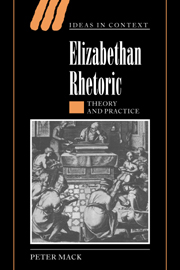Book contents
- Frontmatter
- Contents
- Acknowledgements
- Introduction
- 1 Rhetoric in the grammar school
- 2 Rhetoric and dialectic at Oxford and Cambridge
- 3 English-language manuals of rhetoric and dialectic
- 4 Everyday writing: notebooks, letters, narratives
- 5 Histories, conduct manuals, romances
- 6 Political argument
- 7 Elizabethan parliamentary oratory
- 8 Religious discourse
- Conclusion
- Bibliography
- Index of rhetorical and dialectical terms
- General index
- IDEAS IN CONTEXT
4 - Everyday writing: notebooks, letters, narratives
Published online by Cambridge University Press: 22 September 2009
- Frontmatter
- Contents
- Acknowledgements
- Introduction
- 1 Rhetoric in the grammar school
- 2 Rhetoric and dialectic at Oxford and Cambridge
- 3 English-language manuals of rhetoric and dialectic
- 4 Everyday writing: notebooks, letters, narratives
- 5 Histories, conduct manuals, romances
- 6 Political argument
- 7 Elizabethan parliamentary oratory
- 8 Religious discourse
- Conclusion
- Bibliography
- Index of rhetorical and dialectical terms
- General index
- IDEAS IN CONTEXT
Summary
Most Elizabethans had their strongest and most frequent contact with writing in the form of personal notes and memoranda, letters and legal documents. The composition of many of these documents involved questions of organisation and self-presentation, also sometimes of style, which registered rhetorical competences. We have seen that grammar school education taught pupils to collect sentences and examples in notebooks. Puritans encouraged note-taking as a way of absorbing and reflecting on the teaching of sermons. Margaret Hoby's Diary which records her prayers and church attendance frequently refers to writing in her ‘sermon book’ notes of sermons she has heard a day or two before. An increasingly centralised and bureaucratic decision-making process demanded collection of written evidence and retention of copies of letters. The victims of religious persecution (Catholic or Protestant) wrote narratives to strengthen the courage and hatred of their co-religionists. Since the materials available are so diverse and have rarely been studied before, this chapter will concentrate on a few, possibly atypical examples. At the same time, it is these materials which bring us closest to the experiences and thought-processes of individual Elizabethans.
My study of particular notebooks, letters and narratives will illustrate the impact of the rhetorical skills developed in the grammar school. Moral sentences, arguments, comparisons and political axioms found in books and sermons were collected in notebooks and reused in letters. As well as collecting fragments from texts, Elizabethans took notes of the overall structure of sermons and texts.
- Type
- Chapter
- Information
- Elizabethan RhetoricTheory and Practice, pp. 103 - 134Publisher: Cambridge University PressPrint publication year: 2002



